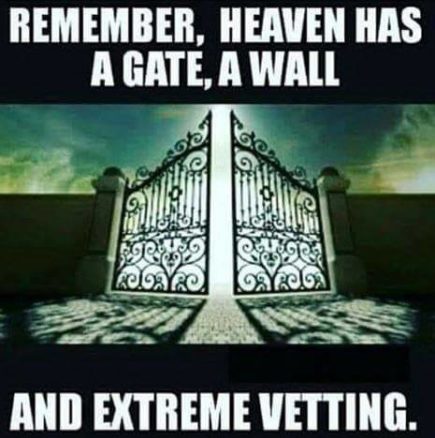You’ve probably seen by now all the pictures of children being taken away from their parents. You’ve also probably seen the detention centers, the TIME magazine cover, the blog posts, the tweets, AG Jeff Sessions defending the practice by quoting Romans 13, President Trump saying that he couldn’t do anything about it, blaming Democrats, doing something about it, and then turning the issue into illegal immigrant crime. No hyperlinks needed; We’ve all seen them.
We’ve also seen and heard people talking about these serious issues. Perhaps you have even seen memes like the one above being thrown into the tumult that is this dragged out conversation about what to do with our borders and the people legally and illegally crossing. I’ve seen Christians on both sides of the aisle make the case for and against almost every type of argument. Yet, the way I see it is that all of these conversations that take place among Christians are happening on a certain ideological level. All of these arguments are made from the category and space of Empire.
Empire doesn’t just exist in Star Wars or history books; it exists today. Like every other empire/superpower, America expends great effort to organize its people, to expand its influence and power whether it be by military, economic, or political means. Empires are upheld by an ideology or a narrative that its people must appropriate in order for the Empire to thrive. Empire can be a morally neutral category. For example, in Romans 13 (the same passage that Sessions referenced) Paul explains that God has given the Empire a role to play in the administration of the punishment and restraint of wrongdoers. Yet, this is not a wholesale acceptance of Empire, but an acknowledgment that an Empire or governing authority can and ought to act in ways that exemplify God’s justice. However, I cannot recall a time in history when the power afforded to an Empire has ever been wielded in a way that promotes prosperity, life, and goodness/justice for all people. Often, Empires look like Star Wars, except in real life, their troopers can aim. The 20th century was rife with Empires in competition, and these struggles resulted in mass murder, poverty, social displacement, genocide, and hatred. While Empires may promise and provide lots of good things for those that accept its narrative, it comes at the expense of the marginalized and those outside of the Empire.
The good news is that Empire does not go unchallenged. Scripture presents another category, another way of life, that can be called Kingdom. This Kingdom represents a community of believers organized under the rule of God. This just, wise, loving, and good King operates in what seems like another dimension than Empire, as it has no military, no economics, no politics that we would think of. For an ideology, it offers the gospel: that Jesus is King and by his death and resurrection, He has defeated death, broken the power of sin, and overthrown the Empire. This Kingdom of God is present, but not fully here yet. This is why we continually pray just as Jesus taught us: “Your Kingdom come, Your will be done, on Earth as it is in Heaven.” This Kingdom (in contrast to Empire) has an ethic committed to the way of Jesus. These ethics are part of what identify followers of Jesus (See 1 John 3).
Now here’s the catch, Empire and Kingdom coexist spatially, but on different levels. Think of it as a parking structure with multiple levels. Your iPhone says you parked your car at this GPS location, but you might be on the wrong floor. As members of the Kingdom, Christians may also be found under the rule of Empire. The Bible is filled with examples of this idea, from Abraham to Daniel, from Paul to John. (and everywhere in between) the people of God have had to navigate how exactly they are to exist in this multi-leveled space (Read Daniel 1-6 if you would like specific examples).
In Jesus’ day, there were several competing understandings of how one ought to be faithful to God while living under Empire. The Essenes or the communities like Qumran simply separated from the Empire, reducing its influence on the culture as well as the culture’s influence on them. The Pharisees remained in the Empire, keeping its influence at arm’s length, but willed to tolerate certain aspects of its rule if they could worship in a sort of freedom. The Sadducees, on the other hand, fell into step with Empire (to a relative degree) choosing to exploit the Empire’s political power for its own ends. With contrasting intentions but similar means, Zealots choose to rebel against the Empire (think Luke Skywalker) using the same means and methods as the Empire’s military.
Jesus embodies an alternative to both Empire itself and these ways of dealing with it. Jesus operates within the Empire as a prophetic voice against injustice, yet he does not use the weapons or power of the Empire. Instead, he submitted to the Empire and endured persecution and suffering, and in doing so, he beat the Empire. The early church became emboldened by the power of the Spirit and in faith, went out to change the world by preaching this good news: that Jesus is King and his Kingdom is coming. The Empire does not hold all the cards. And throughout the first three centuries, the Kingdom of God advanced and was conquering the Empire through gospel preaching and martyrdom. It wasn’t until Constantine converted the Empire to Christianity in the 4th century that our original question began to shift. It was no longer “how do we operate by the Kingdom in the Empire,” but, “How does the Kingdom work with the Empire.” We still haven’t figured that one out.
I wanted to illustrate these two concepts of Empire and Kingdom because our modern-day conversations about immigration can be clarified when we understand to what particular category do our questions and concerns belong. Before returning to our present question concerning borders and immigration, let’s think through a slightly easier issue: Military Spending. The question of how much a geopolitical entity should spend on the military can be discussed on our two levels of Kingdom and Empire. If we were to discuss it from the space of Empire we may argue about how much money we ought to spend, some arguing more, others less. Obviously, the discussion would revolve around any impending threats or wars on the horizon and how this current budget would prepare for that. On the other hand, if we approached this topic from the perspective of the Kingdom it would look very different. The reason is that the existence of a military in the first place is a category error—it doesn’t exist in the Kingdom. So, the conversation would look very strange, because ‘Military’ is something that categorically belongs to Empire. Now, the Kingdom can speak to this issue, but it’s not going to make much sense if it is judged by the values of Empire. In terms of Military Spending, the Kingdom’s budget proposal would most likely call for a very large garage sale. The question of how would the Empire defend itself from invaders, is once again, an Empire categorical question. This is not to say that it’s an inappropriate question. It’s a fine question, but we must understand to which category it belongs to. An Empire has got to have a military, it’s what makes it an empire! But the Kingdom doesn’t have a military, it only has martyrs. So, while it is acceptable for an Empire to have a military, members of the Kingdom will see it differently.
I don’t want to necessarily pit these categories against each other in all respects. Empire is capable of asking good questions that the Kingdom is otherwise unconcerned with. Empires throughout history have been obsessed with roads and how to connect the far-flung regions to the capital. The Roman Empire, in this regard, accomplished a lot of good with its road system. The Kingdom is not de facto in opposition to roads just because it exists as a categorical concern of the Empire. It may or may not be opposed to what those roads are used for, but doesn’t stand in opposition simply because of its category. In short, Empire and Kingdom are mutually exclusive categories, but that does not always imply a negative value judgment.
So, when it comes to illegal immigration and our country’s borders, what set of values are we working with—Empire or Kingdom?
When we discuss the legality of border crossing, when we talk about whether or not it should be a misdemeanor or a felony, when we talk about how we ought to secure our borders, we are discussing it in the terms of Empire. An Empire has borders, and naturally, they must be defended. When we talk about how that should be done, and to what degree should we enforce our laws, we are operating within the category of Empire. When we talk about how Obama or Bush did it first or to a greater degree, we argue from Empire and ultimately for Empire. And again, that’s ok, that is a perfectly reasonable category from which to discuss this issue. We simply must understand that all of these conversations belong to Empire. As Christians, however, our conversation must neither begin nor end with this category. We are not forced to operate solely within the category of Empire; we are called to embody the ethics of the Kingdom and imitate the King. We must go up to the higher level and think through this issue in Kingdom terms. While its focus is on ethnic/religious boundaries, I believe Ephesians 2:12-19 can provide helpful insight to our question:
Remember that you were at that time separated from Christ, alienated from the commonwealth of Israel and strangers to the covenants of promise, having no hope and without God in the world. But now in Christ Jesus you who once were far off have been brought near by the blood of Christ. For he himself is our peace, who has made us both one and has broken down in his flesh the dividing wall of hostility by abolishing the law of commandments expressed in ordinances, that he might create in himself one new man in place of the two, so making peace, and might reconcile us both to God in one body through the cross, thereby killing the hostility. And he came and preached peace to you who were far off and peace to those who were near. For through him we both have access in one Spirit to the Father. So then you are no longer strangers and aliens, but you are fellow citizens with the saints and members of the household of God . . .
It appears that the only boundary or border that exists for the believer is that of faith, whether we will actively trust Jesus to be who he says he is—our King and our Lord. Every other border and dividing wall has come crashing down because Jesus is king and kingdom is for all time, for all people, and over all things. So should a Christian—a follower of Jesus and a member of the Kingdom—support strong borders? The answer is most likely, “No.”
The question remaining is how the Christian should live by the kingdom in Empire. Unfortunately, that must be left for another blog because I am out of time, and I honestly don’t know the answer. I know it’s somewhere between Love your neighbor and be like Jesus, but I’m sure there is a more nuanced and helpful way of articulating this. If you find this to be difficult, you are in good company with me and the rest of Church history! If you have any insights or feedback leave me a comment below.





1 Comment
Leave your reply.